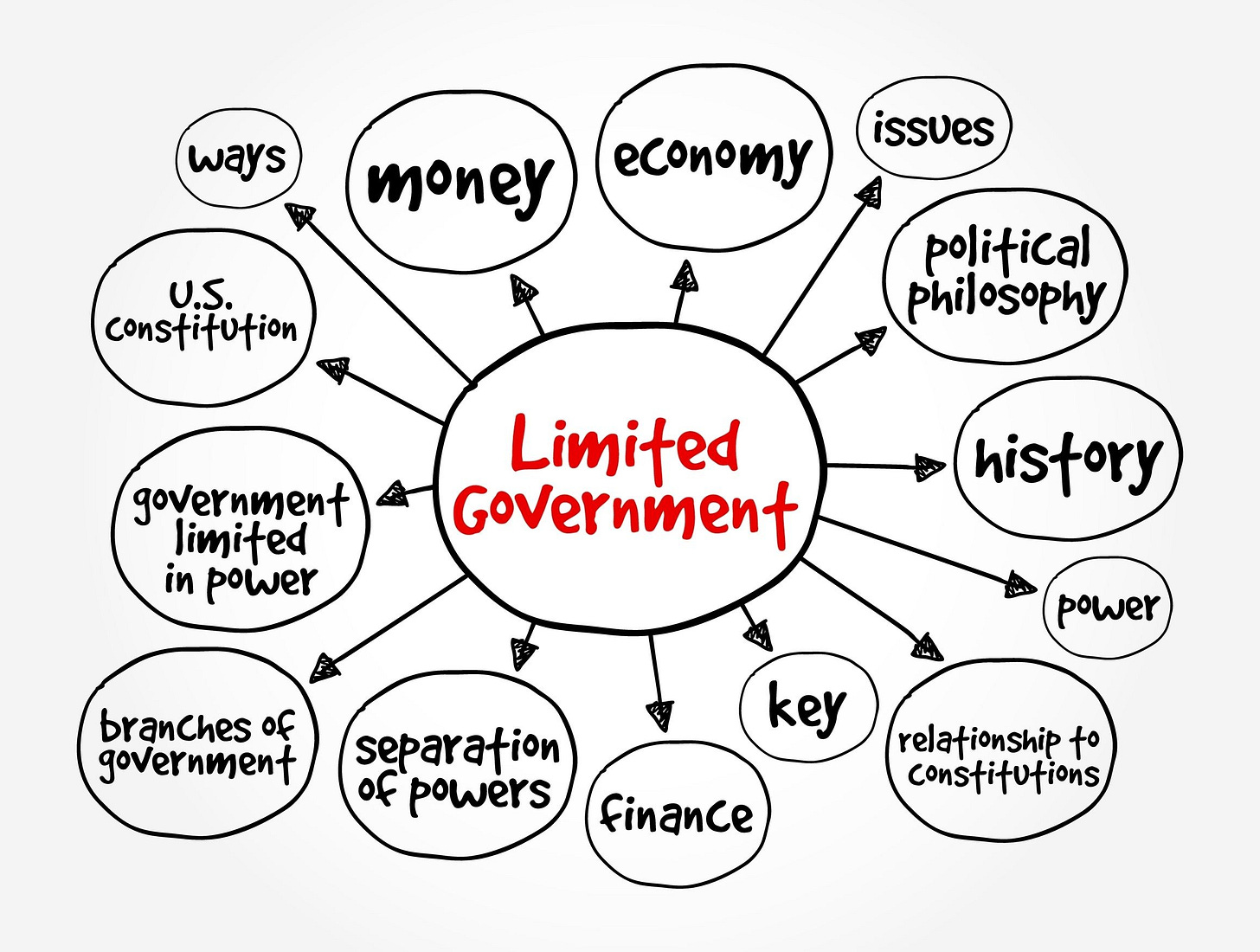E-Pluribus | February 5, 2024
Making deliberative rhetoric great again; giving it the old college try; and limited government under fire.
A round-up of the latest and best musings on the rise of illiberalism in the public discourse:
Erec Smith: Deliberative Rhetoric Is a Necessary Tool for Communal Flourishing
The writer of Ecclesiastes says, “of making many books there is no end; and much study is a weariness of the flesh.” Yet without communication, societies can hardly expect to progress. But rather than allow the loudest voices to win, Erec Smith argues that we should make our words more worthwhile and effective by utilizing deliberative rhetoric.
Deliberation is a branch of rhetoric aligned with politics and civic engagement. Aristotle writes that the “deliberative orator’s aim is utility: deliberation seeks to determine not ends but the means to ends, i.e., what it is most useful to do.” The goal of deliberation, then, is to argue for what is advantageous or disadvantageous for a community’s or society’s future. Whether deliberating for tomorrow, next week or next year, deliberative rhetors aim to persuade people to do what they think is beneficial for all and dissuade them from what they think is detrimental for all.
Deliberation is especially important in a civil, pluralistic and free democracy, where “the people” ultimately in charge of the public good have widely different ideas about what that good should be. Therefore, “deliberative democracy” is the ideal system. Amy Gutmann and Dennis Thompson, political scientists and leading thinkers on the topic, define deliberative democracy as “a form of government in which free and equal citizens (and their representatives) justify decisions in a process in which they give one another reasons that are mutually acceptable and generally accessible, with the aim of reaching conclusions that are binding in the present on all citizens but open to challenge in the future.”
This kind of communication takes place in most civic, professional, educational and political contexts. From school board meetings to city council sessions to the floor of the U.S. Congress, deliberation is used to provide sound reasons for the efficacy of a policy and accept sound refutation from others until the deliberators reach a conclusion that is most advantageous to a community or society at large.
So, what does this have to do with abundance? If people have an idea that will provide the utmost abundance for themselves and others, they can better ensure its implementation if they are skilled in deliberative rhetoric. They can state their case to the local, state or even federal government. Theoretically, citizens with adequate skill in deliberation are more likely to acquire what they want than people who lack this skill.
Lest you think I make this argument out of disciplinary bias (I am a rhetorician, after all), I believe that deliberative rhetoric can open doors to abundance in several walks of life. Being knowledgeable is important, but if you cannot share that knowledge effectively to persuade or collaborate, what good is it? Having a business plan adopted, persuading behavioral scientists of the potential for a new form of therapy, or convincing college administrators of the benefits or detriments of an educational policy all necessitate rhetorical savvy and the ability to deliberate. What’s more, what good are ideas about social justice, civic engagement or local politics if those ideas cannot be explained to a particular audience with reason, rationality and sufficient proof? To bridge this gap between having a good idea and implementing that idea, deliberation should be a focal point of general education.
Read it all.
Micaiah Bilger: Iowa college trustees tried to force president to undergo DEI ‘re-education’: lawsuit
We hear a lot about colleges and universities forcing DEI on their students and prospective faculty members. But one Iowa college turned the tables and tried to require its president (whom they are now seeking to fire) to go back to school himself and get his mind right on DEI. Micaiah Bilger of the College Fix has the details.
The president of Northeast Iowa Community College, placed on administrative leave in October, said in a new lawsuit that the Board of Trustees wanted to force him to undergo “re-education” training on diversity, equity, and inclusion.
Herbert Riedel (pictured), who has served as the college’s president since 2022, said in a statement last week that he believes the trustees’ actions against him are politically motivated.
His lawsuit, filed in January, alleges the board violated a state open meetings law when it voted to pass a performance action plan for him during a closed session in June, the Iowa Capital Dispatch reported.
“The political motivation of the [performance plan] is seen among other things in the initial draft that included a plan to subject me to ‘re-education’ on DEI, a highly ideological and controversial movement favored by some at the College,” Riedel said in the statement.
[. . .]
Earlier, the college said Riedel was placed on leave due to “issues raised during his initial evaluation, complaints regarding hiring practices,” and “complaints regarding treatment of administrative staff,” KCRG-TV9 reported in November.
However, Riedel said in a statement last week that he believes politics are the real reason behind the trustees’ actions.
“When I arrived at the College, the DEI Committee had plans to institute training on gender pronouns and to survey students on private sexuality, gender, and race issues,” he said. “I directed the Committee to follow Iowa’s laws, refrain from controversy, include an openness to viewpoint diversity, and foster a workplace and learning environment that is respectful of employees and students, while promoting diversity and inclusiveness.”
Read the whole thing.
Peter Berkowitz: Prof. Moyn’s Jeremiad Against Limited Government
America’s founders established a unique nation by placing strict limits on the federal government’s authority. But not everybody is a fan of federalism—including many on the progressive left and their opponents on the new right. At Real Clear Politics, Peter Berkowitz writes that a Yale University law professor’s recent book is yet another attempt to move the United States even further away from its foundational principle of limited government.
America’s progressive left and much of the so-called new right resent the idea of limited government. They see it as a pernicious ideology that they like to call liberalism, worse, neoliberalism, and, at the extreme, neoconservatism. In fact, they object to an essential principle of American constitutional government and the modern tradition of freedom.
The progressive left and new right alike deplore the conviction that some worthy and even essential tasks – for some the regulation of pronouns, for others the regulation of religion – lie beyond government’s proper purview. Such limitations, they complain, constrain their high-minded ambitions to reorient society toward the highest good or justice in the fullest sense.
[. . .]
Members of the progressive left and new right overlook, misunderstand, or suppress the mixture of reasonable skepticism and firm moral conviction that underlies limited constitutional government in America. Sam Moyn’s recent book exacerbates the problem.
In “Liberalism Against Itself: Cold War Intellectuals and the Making of Our Times,” which was published last year and provoked lively discussion, the Yale University professor of law and history harshly criticized an eclectic mix of eminent intellectuals from the 1940s to the 1990s for their defense of limited government. Of all his book’s peculiar features, the most striking is Moyn’s treatment of limited government as a disastrous departure from the Enlightenment and the liberal tradition. In reality, Cold War liberalism rediscovered fundamental principles – part of the rich heritage of the Enlightenment and the larger modern tradition of freedom of which it is a part – on which the United States was founded.
Moyn focuses his discussion of Cold War liberalism’s betrayals around six distinguished intellectuals who have rarely been grouped together: Harvard University political theorist Judith Shklar, Oxford University professor of moral and political thought Isaiah Berlin, philosopher of science and defender of the open society Karl Popper, historian of modern thought Gertrude Himmelfarb, student of classical and modern political thought Hannah Arendt, and Columbia University literary critic Lionel Trilling. Other than the opportunity for a few cheap shots at their Zionism – or failure to criticize Zionism – provided by their varying relations to Judaism, there is little reason to base an assessment of Cold War liberalism on Moyn’s collection of intellectuals rather than on one that revolves around, say, Friedrich Hayek, Reinhold Niebuhr, Raymond Aron, Jean J. Kirkpatrick, and Daniel Patrick Moynihan.
[. . .]
“What this book actually argues, though its author does not know it or want it to be so, is that the Cold War liberals grasped the most pressing moral problem and political challenge of their lifetime with unwavering clarity,” shrewdly observes Tod Lindberg in reviewing Moyn’s book in Commentary. “They understood that Communism, like Nazism, was evil, and that freedom, which starts with individual liberty, is good in itself, but fragile. They recognized that the ambition on the other side was total – that is, totalitarian – and in hot pursuit of global victory, both ideologically and politically. They sought to thwart this victory as best they could in their area of comparative advantage, the life of the mind.”
Read it all here.
Around Twitter (X)
Douglas Murray got a less-than-rousing reception in the United Kingdom over the weekend. UK journalist David Collier was appalled:
When “Woke” is part of the name of the organization…
And finally, with a combination like this, how can they miss?











